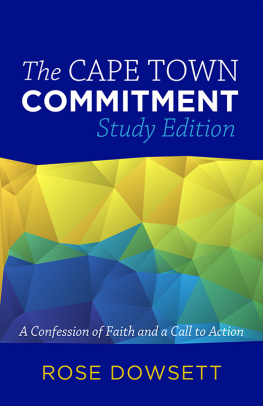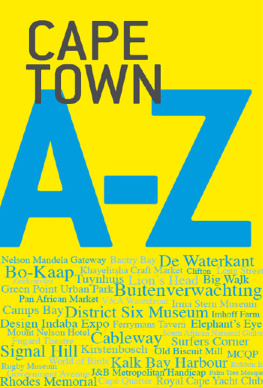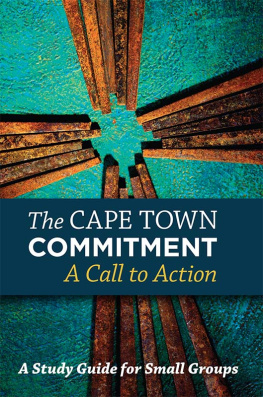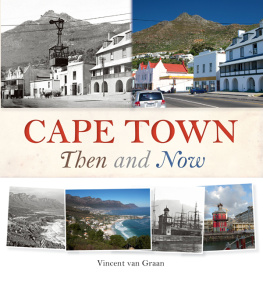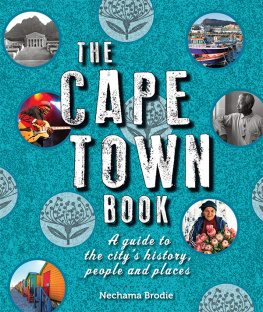USING THE STUDY EDITION
The Cape Town Commitment (CTC) is not Scripture, and it must sit under Scriptures searching authority. We do not wish to make too-large claims for the CTC. Because it is a human creation, it will be flawed and incomplete. At the same time, those who wrote it worked hard and prayerfully to try to ensure that everything in it flows from and is in tune with Scripture. For the CTC to be meaningful and useful, Christians need to study it carefully, measuring it against Gods Word, and then prayerfully think about how to translate it into action.
Why a study guide?
With any long document, it is helpful to break it down into sections for closer study and reflection. This study guide is designed to help us to do that.
Each part of the CTC is incomplete without the other. Part I, The Cape Town Confession of Faith, establishes a theological framework for Christian discipleship and for mission. Part II, The Cape Town Call to Action, focuses on the central themes of the Congress, and on what we need to do. Theology without action degenerates swiftly into philosophy; action without theology degenerates swiftly into activism and humanism. Theology and action must be kept together, each informing the other.
Studying small sections at a time will help us engage more deeply with the text. It will also be especially helpful where the Cape Town Commitment is studied in local congregations, seminary classes, or in small groups.
Different ways of studying
One of the difficulties in writing a study guide is that in different cultures and contexts people have widely varying ways of processing informationstudying it, organising it, sharing it in a group, and responding to it. For instance:
Some of us are accustomed to analyse logically and in linear fashion. We may be comfortable with the written word. We may like sitting with pen in hand and writing answers in spaces provided, or doing the same thing on a computer.
Some of us may be happy studying on our own in a quiet place and with ample time for reflection.
Some of us prefer to work in groups, and learn orally. Here, study and decisions on action become a community task just like every other part of life.
Some of us express everything that is important to us in song and transmit it in this form through the community and down the generations. From the days of the Psalms onwards, this has been central to internalising Gods truth and feeding faith.
Some of us find it difficult to engage with ideas and propositions and need to learn through stories and concrete illustrations. The Bible is full of them!
Some of us expect an expert or our leader to tell us what to think and do and would regard it as unacceptable to voice our opinions until we are very senior or have heard what our leader thinks.
Some of us find emotional engagement or practical action more compelling than intellectual engagement.
Some of us are big-picture people and find close, detailed examination of a small part of the whole difficult. Others of us prefer to handle information in small chunks.
Adapt this study edition to suit your context and your preferred ways of learning. The questions are designed for you to dig deeper, on your own or in group discussion, and to form a prayerful response and realistic action.
Diversity in our unity... and unity in our diversity
The church is global as never before: praise God! But as Gods Word has taken root in different cultures and languages, the church has become increasingly complex in the way in which different communities contextualise the faith. Todays constituencies for The Lausanne Movement and the World Evangelical Alliance (WEA) have become diverse in a way unimaginable a few decades ago.
Some find this unsettling and would like to impose one template of orthodoxy and orthopraxisthat is, formulations of theology and formulations of practiceon everyone everywhere. Others rejoice in the diversity. The CTC is not a template of orthodoxy and does not make claims to be. It does, however, draw together many different Christian streams, as we unite around Gods gospel and Word and around a shared commitment to make disciples of all nations, all in the context of worship of the triune God. Our prayer is for breadth within boundariesboundaries set by Gods Word.
Because of the careful, extensive process by which the CTC was drawn up, we dare to believe that it is worthy of close study, that it may in the grace of God be an instrument of greater unity among Gods people, and that it may in some measure provide an agreed roadmap as we work together to take the good news of Jesus Christ to the nations.
So, we invite you to join us on this journey, for the glory of God and the good of his precious world. As you study, whether on your own or in a group or congregation, first read (or hear) the section to which the questions relate. In particular, make sure you look at the Scripture references, because these are our true foundation. In each section, there are overview questions, especially helpful for those who need just one concept to ponder. Then there are further questions for those who wish and are able to dig deeper.

